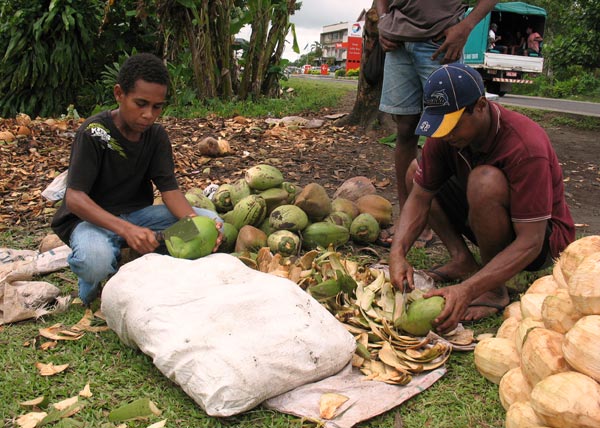Fiji's coconut sellers dream of escaping poverty
Updated: 2012-05-05 08:42
(China Daily)
|
||||||||
 |
|
Gio Vakaloloma (left) removes coconut husks with a machete in Suva, Fiji. He is among the one-third of Fiji's 840,000 population who live below the poverty line. [Photo/Agencies] |
After being forced to drop out of school last year because his family needed more income, Gio Vakaloloma turned to the only job available - selling coconuts on the streets of Suva.
Early every morning, the slightly built 13-year-old shimmies up the palm trees that grow abundantly in the Fijian capital and begins throwing down green coconuts to his friends below.
Vakaloloma is among the one-third of Fiji's 840,000 population who live below the poverty line, in conditions far removed from the postcard idyll of beaches and cocktails normally associated with the Pacific island nation.
"It's good to get money to give my family so they can buy more food," said Vakaloloma, who joined a loose-knit group of about a dozen youths who sell coconuts to passing motorists at a roadside stall in the suburb of Raiwaqa.
He did not regret swapping the classroom for an often dangerous existence climbing coconut trees, saying he was proud to help his family survive.
Shimmying up palms to retrieve coconuts, which contain watery milk that provides a refreshing drink when the top of the shell is lopped off, is a traditional test of endurance and strength for village youths in Fiji.
Guinness World Records says the fastest-ever tree climb was performed by a Fijian, Fuatai Solo, when he a scaled a 9-meter coconut palm in 4.88 seconds during a competition in Suva in 1980.
But the Pacific staple, found growing wild all over the islands, has also become an important source of income in urban areas for groups like Vakaloloma's as Fiji's economy struggles after years of military dictatorship.
"We can earn Fj$60-100 ($34-56) a day, much more than what you get working in a shop," said Ben Tiko, who, at 22, is the informal leader of the group.
"Business is pretty good. People used to prefer fizzy drinks but more people want coconuts now because they're healthy. The men all come for them in the morning when they've had grog the night before."
He explained that police kept the groups of roadside coconut sellers separated, dotted a interval about 1 kilometer apart along the roadside to prevent them encroaching on each other's territory.
The work begins at 6 am, when they scale the palms and fill hessian sacks with as many coconuts as they can carry, removing the outer husk with machetes before they are sold.
He said the operators of Fiji's luxury resorts also hired his group and others once or twice a year to remove coconuts from their properties so they did not fall on the heads of unsuspecting tourists.
Tiko said the job was not without its risks but was an only option in an economy which the IMF said earlier this year, had little prospect of growth in the immediate future.
"I've fallen down and hurt myself," he said. "People break an arm or break a leg. The main thing is not to fall on your head."
Agence France-Presse

 Relief reaches isolated village
Relief reaches isolated village
 Rainfall poses new threats to quake-hit region
Rainfall poses new threats to quake-hit region
 Funerals begin for Boston bombing victims
Funerals begin for Boston bombing victims
 Quake takeaway from China's Air Force
Quake takeaway from China's Air Force
 Obama celebrates young inventors at science fair
Obama celebrates young inventors at science fair
 Earth Day marked around the world
Earth Day marked around the world
 Volunteer team helping students find sense of normalcy
Volunteer team helping students find sense of normalcy
 Ethnic groups quick to join rescue efforts
Ethnic groups quick to join rescue efforts
Most Viewed
Editor's Picks

|

|

|

|

|

|
Today's Top News
Health new priority for quake zone
Xi meets US top military officer
Japan's boats driven out of Diaoyu
China mulls online shopping legislation
Bird flu death toll rises to 22
Putin appoints new ambassador to China
Japanese ships blocked from Diaoyu Islands
Inspired by Guan, more Chinese pick up golf
US Weekly

|

|







